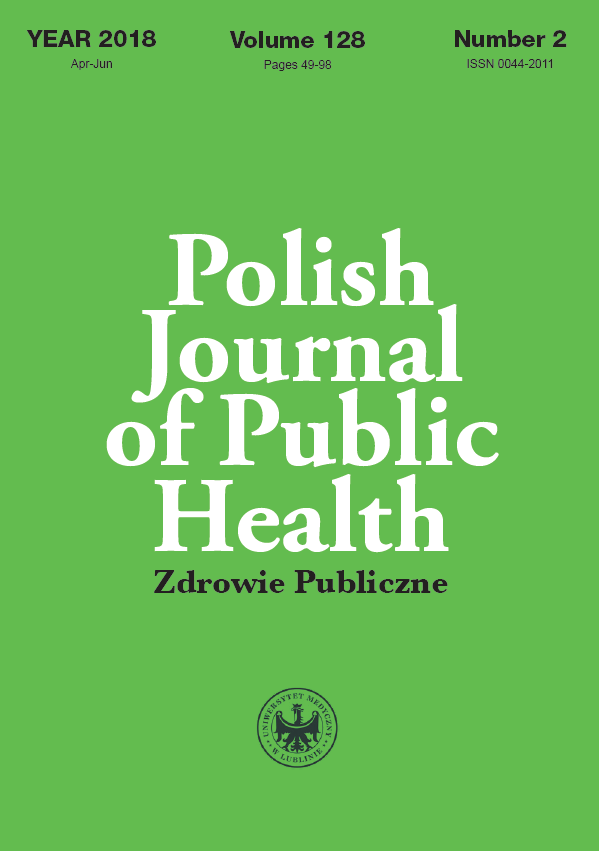The legal status of physiotherapists’ profession
DOI:
https://doi.org/10.2478/pjph-2018-0012Keywords:
physiotherapists , profession of public trust, medical profession, healthcare system, healthcare services, medical activitiesAbstract
Physiotherapy is a discipline of clinical medicine, using its own diagnostic and therapeutic methods, including the treatment of movement and physical stimuli. The new legal regulations resulting from the Act of 25 September 2015 on the Profession of Physiotherapy have granted a special professional status to this group of specialists, what results from the fact that it is recognized as an independent medical profession. It should be noted, however, that the introduced law, although expected for many years, did not stabilize the legal situation of this professional group until the end. There are still doubts of a juridical nature which make it difficult to provide unambiguous answers to the basic questions regarding the legal status of physiotherapists as persons performing an independent medical profession. This publication, referring to the applicable statutory regulations and views presented in the legal doctrine, analyzes the current legal status, indicates the weaknesses of the adopted legislative solutions and avoids the changes
References
1. M. Starczyńska J, Karwacińska B, Stepanek-Finda W, et al. Historyczne podstawy fizjoterapii. Studia Med. 2011;21:71-7.
2. Act of 25 September 2015 on Physiotherapist’s Profession (Dz.U.2015.1994), hereinafter referred to as the Act on Physiotherapist’s Profession or the APP.
3. Justification of the draft Act of the Sejm of the Republic of Poland for the seventh term of office. Print No.: 3001, draft of the Act on the physio-therapist’s profession and changes of other Acts; http://www.sejm.gov.pl/ Sejm7.nsf/PrzebiegProc.xsp?nr=3001;
4. The Act of 15 April 2011 on Therapeutic Activity, Dz.U. 2015, item 618, as amended, hereinafter referred to as ATA;
5. The Act of 6 November 2008 on Patients’ Rights and Patient Ombudsman, consolidated text - Dz. U. 2017, item 1318 with amendments - hereinafter referred to as APR.
6. The Constitution of the Republic of Poland OF 2nd APRIL, 1997 (Dzien¬nik Ustaw No. 78, item 483).
7. The Act of 27 August 2004 on Health Care Services Financed from Public Funds ( consolidated text Dz. U. 2017, item 1938, as amended - hereinafter called AHCS).
8. Karkowska D. Zakres przedmiotowy pojęcia „zawód medyczny”. In: Za¬wody medyczne. Warszawa; 2012. Lex el. 15 1446.
9. The Act of 12 May 2011 on Reimbursement of Medicines, Food Products for Particular Nutritional Uses and Medical Devices (Dz.U. 2017, item 1844, as amended - hereinafter called Reim)
10. Resolution of the Supreme Court of 31 August 1994. IKZP 20/94, OSP 1995, vol. 2, item 40.
11. The Penal Code of 6 June 1997 (Dz.U. 2017, item 2204 and Dz.U. 2018, item 20 and 305 as amended - hereinafter called PK)
12. Resolution no 20/I KZF/2016 of I Krajowego Zjazdu Fizjoterapeutów (I National Convention of Physiotherapists) of 29 December 2016 on „Zasady etyki zawodowej fizjoterapeutów” (“Rules of Professional Ethics of Physiotherapists”); access: https://kif.info.pl/wp-content/ uploads/2017/01/20-I-KZF-2016-zal.pdf; 25.06.2018].
13. Białoszewski D, Wroński Z. Nowa pozycja fizjoterapeuty wśród zawodów medycznych w świetle nowych zapisów prawnych i nowego systemu kształcenia zawodowego. In: D. Białoszewski, Z Wroński (eds). Fizjotera¬pia w Polsce Warszawa; 2017. p. 7.
14. The Act of 6 March 2018 - Law on Entrepreneurs (Dz.U. 2018, item 646).
15. Kocowski T. Zawód zaufania publicznego w gospodarce rynkowej – rzeczywistość czy przeżytek. In: U. Kalina-Prasznic (ed). Stare dogmaty – nowe wyzwania w prawie i ekonomii. Wolters Kluwer Business; 2003. p 135-53.
16. Komentarz do Art 17 Konstytucji RP. In: Konstytucja RP. Komentarz Saf¬jan, Bosek (eds), 2016, Edition 1/Szydło, p. 434
17. Wojtczak K. Zawód i jego prawna reglamentacja. Poznań; 1999. p. 84
18. Krasnowolski. Zawody zaufania publicznego, zawody regulowane oraz wolne zawody. Geneza, funkcjonowanie i aktualne problemy. Warszawa; 2013. p. 3.
19. Kłusek P. Fizjoterapeuta jako wolny zawód i zawód zaufania publicz¬nego. ROZPRAWY NAUKOWE Akademii Wychowania Fizycznego we Wrocławiu; 2016. p.53, 44-56.
20. Directive 2005/36/EC of the European Parliament and of the Council of 7 September 2005 on the recognition of professional qualifications (Official Journal L 255, p. 22),
21. The Act of 18 March 2008 on the rules for the recognition of profession¬al qualifications acquired in the Member States of the European Union (Dz.U. No. 63, item 394)
22. The Regulation of the Prime Minister of 27 February 2017 on the list of regulated professions and regulated activities in the performance of which the service provider has a direct impact on public health or safety, for which proceedings for recognition of qualifications can be initiated (Dz.U.2017.468).
Downloads
Published
Issue
Section
License
Copyright (c) 2018 Polish Journal of Public Health

This work is licensed under a Creative Commons Attribution-NonCommercial-NoDerivatives 3.0 Unported License.


